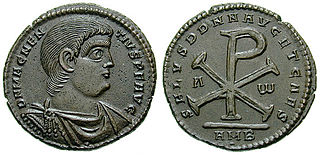
Marcus Aurelius Antoninus, better known by his nicknames Elagabalus and Heliogabalus, was Roman emperor from 218 to 222, while he was still a teenager. His short reign was notorious for sex scandals and religious controversy. A close relative to the Severan dynasty, he came from a prominent Arab family in Emesa (Homs), Syria, where since his early youth he served as head priest of the sun god Elagabal. After the death of his cousin, the emperor Caracalla, Elagabalus was raised to the principate at 14 years of age in an army revolt instigated by his grandmother Julia Maesa against Caracalla's short-lived successor, Macrinus. He only posthumously became known by the Latinised name of his god.

Marcus Opellius Macrinus was Roman emperor from April 217 to June 218, reigning jointly with his young son Diadumenianus. As a member of the equestrian class, he became the first emperor who did not hail from the senatorial class and also the first emperor who never visited Rome during his reign. Before becoming emperor, Macrinus served under Emperor Caracalla as a praetorian prefect and dealt with Rome's civil affairs. He later conspired against Caracalla and had him murdered in a bid to protect his own life, succeeding him as emperor.
The 220s decade ran from January 1, 220, to December 31, 229.

Year 221 (CCXXI) was a common year starting on Monday of the Julian calendar. At the time, it was known as the Year of the Consulship of Gratus and Vitellius. The denomination 221 for this year has been used since the early medieval period, when the Anno Domini calendar era became the prevalent method in Europe for naming years.
The Seleucid king Seleucus V Philometor, ruler of the Hellenistic Seleucid kingdom, was the eldest son of Demetrius II Nicator and Cleopatra Thea. The epithet Philometor means "mother-loving" and in the Hellenistic world usually indicated that the mother acted as co-regent for the prince.

Julia Maesa was a member of the Severan dynasty of the Roman Empire who was the grandmother of emperors Elagabalus and Severus Alexander, elder sister of empress Julia Domna, and mother of Julia Soaemias and Julia Mamaea. She wielded influence during the reigns of her grandsons as Augusta of the Empire from 218 to her death, especially on their elevation to emperors.

Diadumenian was the son of the Roman emperor Macrinus and served as his co-ruler for a brief time in 218. His mother, Macrinus' wife, is called Nonia Celsa in the unreliable Historia Augusta, though this name may have been fictional. Diadumenian became caesar in May 217, shortly after his father's accession to the imperial throne. Elagabalus, a relative of the recently deceased Caracalla, revolted in May of the following year, and Diadumenian was elevated to co-emperor. After Macrinus was defeated in the Battle of Antioch on 8 June 218, Diadumenian was sent to the court of Artabanus IV of Parthia to ensure his safety; however, he was captured and executed along the way. After his death and that of his father, the Senate declared both of them enemies of Rome and had their names struck from records and their images destroyed — a process known in modern scholarship as damnatio memoriae.
Verus was a Roman usurper.

Annia Aurelia Faustina was an Anatolian Roman noblewoman. She was briefly married to the Roman emperor Elagabalus in 221 and thus a Roman empress. She was Elagabalus' third wife.

The Battle of Antioch was fought between the Roman army of the Emperor Macrinus and his rival Elagabalus, whose troops were commanded by General Gannys, probably a short distance from Antioch. Gannys' victory over Macrinus led to the downfall of the emperor and his replacement by Elagabalus.
Gellius Maximus was a Roman usurper, who, in 219 AD, revolted against Emperor Elagabalus. His rebellion was swiftly crushed, and he himself was executed.

The Battle of Mons Seleucus was fought in 353 between the forces of the Roman emperor Constantius II and the forces of the usurper Magnentius. Constantius' forces were victorious, and Magnentius later committed suicide.

The Emesenedynasty, also called the Sampsigeramids or the Sampsigerami or the House of Sampsigeramus, were a Roman client dynasty of Arab priest-kings known to have ruled by 46 BC from Arethusa and later from Emesa, Syria, until between 72 and 78/79, or at the latest the reign of Emperor Antoninus Pius (138–161). Iamblichus, the famous Neoplatonist philosopher of the third century, was one of their descendants, as was empress Julia Domna, matriarch of the Severan dynasty.

La Bâtie-Montsaléon is a commune in the Hautes-Alpes department in southeastern France.
Pomponius Bassus was a Roman senator active during the reigns of Septimius Severus, Caracalla, and Geta.
Gaius Vettius Gratus Sabinianus was a Roman senator who was appointed consul in AD 221.
Aelius Decius Triccianus was a Roman usurper, who revolted against Emperor Elagabalus. He revolted against Elagabalus using troops still loyal to Macrinus, the previous emperor who Elagabalus had overthrown, and who Triccianus had served under. The revolt was put down, and he was executed. A damnatio memoriae was issued against him, making it impossible to establish the date of his rebellion or death.









